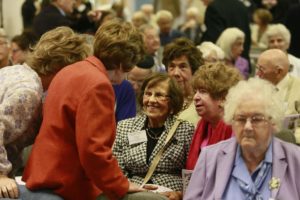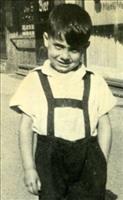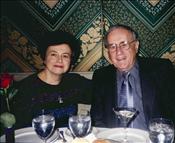Nicholas Winton is someone whose life is a worthy subject. He was an English Holocaust rescuer who was the primary moving force behind the Kindertransport program that rescued Czech Jewish children from the Nazis. Unfortunately, each of Minac’s three films on Winton is preachy, bathetic and clumsily manipulative. Nicky’s Family, the latest film is certainly the best of the three, but that is a relative judgment.
On the 75th anniversary, the Prince of Wales hosted a reception in honor of a few hundred aging Kindertransport participants.The prince spent two hours at the event, which was sponsored by the Association of Jewish Refugees. Prince Charles “was charming. He seems interested in everybody, and I was very impressed,” Joe Garten of Roslyn, L.I., who attended the reception with his fellow-refugee wife, Bea, told the Jewish Chronicle.

Kindertransportees Ann and Bob Kirk meet HRH The Prince of Wales
More than 400 now elderly people started new lives in Britain after they were sent from countries including Germany, Austria and Czechoslovakia in the Kindertransport. They gathered at the Jewish Free School, in the Mall, Kenton on Sunday for a reunion, and survivors and their families attended a lunchtime reception hosted by HRH The Prince of Wales on Monday.

Hundreds gather for Kindertransport reunion
A generation of young Jewish refugees who escaped Nazi occupied Europe as children met again for the 75th reunion of the movement that helped them escape. More than 400 who took part in the Kindertransport met at the Jewish Free School, in The Mall, Kenton, on Sunday June 23 for the reunion.
MEMORIES of fleeing pre-war Nazi Germany have come flooding back to a Gower pensioner following a royal invitation to visit London. Ellen Davis arrived in Swansea in 1939 as one of 10,000 Jewish children sent abroad to escape Nazi atrocities. The rest of her family, including her brother and sisters, were sent to a concentration camp in Latvia where they were shot and killed.

Alfred and Miriam Buechler
Alfred Buechler, 87, and wife Miriam, 78, were guests of Prince Charles on Monday to remember the Kindertransport – a rescue mission that brought around 10,000 children here between 1938 and 1939. Alfred was one of the Kinder, as the rescued children refer to themselves, while Miriam survived two Nazi camps with the rest of her family.

Bernd Koschland, transported from Bavaria, aged 8
Ten thousand children were evacuated by parents desperate to get them to safety. Acts of commemoration are taking place this week, but as survivors grow old, how should their stories be remembered? BBC Newsnight hears the stories of four of them.

Reporter Susan Bookbinder with 2g’s Barbara Dresner and Thomas Bonin
Learn, Learn, Learn – they can take everything from you except what’s in your brain. A mother’s last words to her teenage daughter at Leipzig Central Station in August 1939. Feige Mendzigursky wore a name tag stamped with swastikas around her neck – the pass was virtually all she had – but it was to save her life.

Young Leo Metzstein
Leo Metzstein, 81, was one of 10,000 Jewish children living in Germany who were allowed out the country by Nazi dictator Adolf Hitler before the outbreak of World War II in 1939.
One of the most interesting things about the coverage of Margaret Thatcher’s death was the revelation that her father, Alderman Roberts of Grantham, took in a Jewish refugee girl and gave her a new life. The story was similar to that of the Attenboroughs – the parents of Richard and David – who provided a home for two German Jewish girls who arrived here on the Kindertransport.
Year 6 welcomed several very special guests on Thursday afternoon. Not only did Rabbi Bernd Koschland come to tell the children all about his experiences of the Kindertransport, he brought along with him the Newsnight film crew! Rabbi Bernd’s story is remarkable. Born in a small town near Nuremburg in Germany, he witnessed first hand world changing events.
The candles were lit for the Jewish festival of Hanukkah as 10-year-old Ruth Heber and her seven-year-old brother Harry left their family’s rented rooms in Vienna for the last time, almost 75 years ago. “Our father blessed us and we went to the station,” she remembers. “It was in the evening so the public would not know what was going on. My parents were not allowed on the platform. They said: ‘Be a good girl and we will be writing and thinking of you and we will be coming very soon.’”

Eva Schaal left Berlin during the Holocaust on the Kindertransport, a rescue mission to get Jewish children out of Nazi Germany, Austria, Czechoslovakia, Poland and the Free City of Danzig.
Eva Schaal remembers the night Adolf Hitler came to power. She was 11 years old, and was performing on stage when she heard an announcement over the city’s loudspeakers: Hitler had been appointed chancellor of Germany. That night, Schaal saw swastikas all over the streets of Berlin. She vividly remembers seeing soldiers marching in celebration.
Lore Jacobs, whose 89th birthday is Wednesday, and her daughter Gale Halpern spoke to students Monday about Jacobs’ own story. She was born in Frankfurt, like Anne Frank, and both girls grew up Jewish in mixed neighborhoods. Both were also victims of discrimination, but Jacobs was able to escape Germany through a program called the Kindertransport.

Kurt and Margaret Goldberger had much in common when they met at a social club in New York City in 1947, two years after World War II. Both owed their lives to a unique program that transported Jewish children, without their parents, out of Nazi-controlled regions of Europe to safety in England. The Goldbergers will tell their stories at 7 p.m. Thursday April 11 at the Interfaith Holocaust Commemoration at Congregation B’nai Emunah, 17th Street and Peoria Avenue, Tulsa, Oklahoma.
When it comes to memories as an 8-year-old in 1938, Kurt Herman can recall: how his school friends in Vienna shunned him days after Hitler annexed Austria; how his father hid at the top of a closet when Nazis searched their apartment; and he and 49 other children were rescued in the largest single kindertransport to the United States. But even Herman, now 83, was surprised to learn some of the details that emerge from a new documentary, 50 Children: The Rescue Mission of Mr. and Mrs. Kraus.
Gilbert and Eleanor Kraus lived a comfortable life in 1930s Philadelphia, where he made a good living as a lawyer, and she kept a stylish house. They were secular Jews who sent their children to a Quaker school, and unlikely candidates for the mission they assigned themselves. Gilbert revealed the plan to his wife as he was shaving in the bathroom, so their young son and daughter would not hear. He wanted to go to Vienna and save 50 Jewish children from the Nazis.
Inge (Blank) Langham died in Napa on March 30, 2013, surrounded by family. She was born in 1925 in Dortmund, Germany. After Kristallnacht, Inge arrived with her sister, Doris, in England via the Kindertransport in 1938. She survived the Blitz in England and arrived in the United States in 1940, where she completed her education.
HBO Documentary Tells Story of Kindertransport That Saved 50 Children Film Reveals Philadelphia Family’s Role in Daring Rescue 50 Children: The Rescue Mission of Mr. and Mrs. Kraus,” will be aired April 8, 2013 at 9 p.m., on HBO.
Kind Geoffrey Hartman has written an article for Tablet. What the Dead Have To Say to Us Yale’s pioneering archive of Shoah testimonies reshaped the way tragedies are remembered. But are we listening? In the spring of 1979, Dori Laub, a Yale psychiatrist and child survivor of the Holocaust, and Laurel Vlock, a dynamic New Haven radio and TV interviewer, met with four survivors who had volunteered to answer questions about their experiences… the session lasted past midnight.